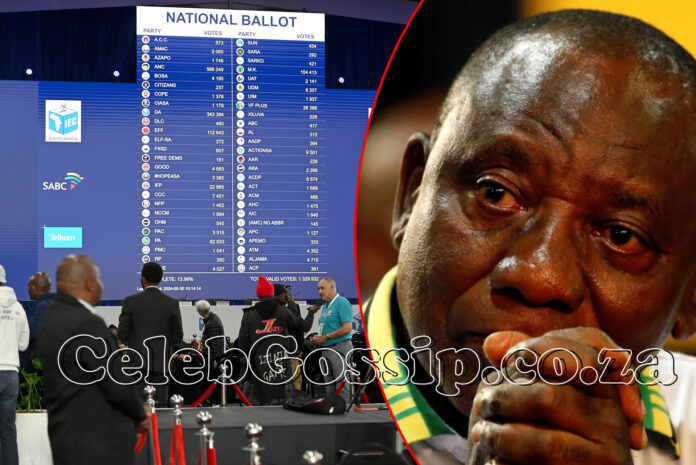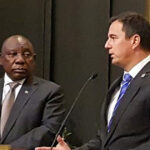Johannesburg, South Africa – In a stunning turn of events, the African National Congress (ANC), the ruling party that has dominated South Africa's political landscape since the end of apartheid, is on the brink of losing its outright majority for the first time in three decades., Celeb Gossip News has learnt As the dust settles on the 2024 general elections, projections indicate a breathtaking 15-percentage-point decline in the ANC's support, with the party's stronghold provinces facing potential upsets that could reshape the nation's political future.
The ANC's iron grip on power, which has endured since the country's first democratic elections in 1994, is now under threat like never before. With projections suggesting a decline in support to 42.3%, the ANC finds itself on unsteady ground, facing the possibility of having to form coalitions to maintain control. These projections, based on meticulous analysis of voting district results, have sent shockwaves through the country, leaving political pundits and citizens alike questioning the ANC's future as the dominant force in South African politics.
While the ANC's decline in support is a significant development in itself, what makes this election cycle truly remarkable is the potential loss of majority in key provinces. KwaZulu-Natal, historically an ANC stronghold, is at risk of slipping from the party's grasp due to the emergence of the uMkhonto weSizwe Party (MKP). This splinter group, led by former president Jacob Zuma, has gained considerable traction, posing a formidable challenge to the ANC's traditional power base.
Moreover, in Gauteng, the province with the country's largest economy, the ANC's support is on a downward trajectory. According to projections, the party's backing in Gauteng, which has been a crucial stronghold for the ANC, is set to decline to a mere 35%. This dip in support, combined with the rise of opposition parties, raises the possibility of a political earthquake that could reshape the province's political landscape.
The Western Cape, already under the control of the Democratic Alliance (DA), is also poised to witness a seismic shift. Projections indicate that the ANC's majority in the province is under threat from the MKP, further diminishing the ANC's influence in key regions across the country. These developments highlight the growing discontent among South African voters, who are seeking alternatives to the ANC's long-standing rule.
As the ANC grapples with the imminent loss of its outright majority, the party now faces a challenging task of forming coalitions to maintain its hold on power. Options are limited, and the ANC must carefully consider its potential partners. The Democratic Alliance, a more market-friendly option, presents one possibility, but such a coalition would undoubtedly have far-reaching implications for both parties.
However, the ANC's potential alliance with the Economic Freedom Fighters (EFF) cannot be dismissed. Already in play in Gauteng metros such as Ekurhuleni and Johannesburg, this partnership could become a game-changer. But even with the EFF's support, projections indicate that the ANC would still require additional smaller parties to cross the 50% threshold in Gauteng, further complicating the party's path to maintaining control.
While the ANC's decline may seem like a political earthquake, it also signals an opportunity for South Africa's political landscape to evolve. The emergence of alternative parties and the shifting allegiances of voters reflect a growing desire for change and a more diverse political landscape. As the ANC's grip on power loosens, other parties are poised to step into the spotlight, offering fresh ideas and visions for the future.
As the nation eagerly awaits the official results from the Electoral Commission of South Africa (IEC), South Africans find themselves on the cusp of a new political era. The outcome of these elections will not only shape the immediate future of the ANC but will also determine the trajectory of South Africa's democracy. The political landscape is shifting, and the ANC's once unassailable majority is now in question. As the country braces for coalition talks and an uncertain future, only time will tell how this seismic shift will reshape the nation's political narrative.
In this critical moment, South Africa stands on the precipice of change, and one thing is certain – the era of ANC's unchallenged dominance is coming to an end, making way for a new chapter in the country's political history.











